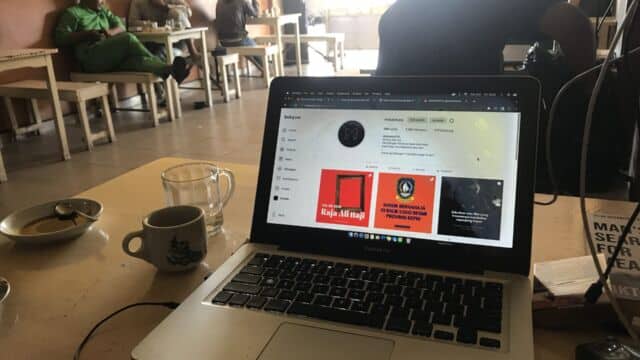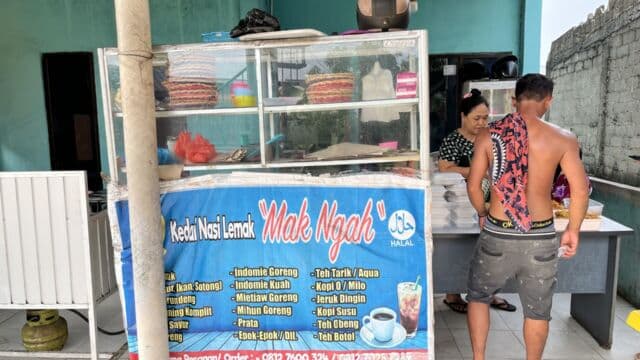The Heart of Minangkabau Can Feel Far From Freedom
A village in West Sumatra | 3,673 words
Translated from Bahasa Indonesia by Sarah Leys
I live in a kampung, quite far up a mountainside, in the Minangkabau Highlands. About 15 kilometres from the tourist city of Bukittinggi, and 10 kilometres from a small city of very frequent rains named Padangpanjang. The kampung has cool weather, and a people still bound to tradition, visibly religious as followers of the Prophet Muhammad. From mosques and musallas at every prayer-time come sounds of recitations of the scriptures, children studying and memorizing the Quran, and other religious lessons. Processions and ceremonies which constitute part of adat (an all-encompassing name for a set of local traditions and customs) happen continuously and trace life’s rhythms: birth, the onset of adulthood, marriage and the starting of families, death.
I became an inhabitant of this kampung eight years ago, when I married a woman from here. As a man from the Minangkabau culture, the largest matrilineal society on earth, where family membership is drawn from the female line, I was obliged to live in the house of my wife’s clan family. While it’s possible to later ‘descend’ from there, as it’s called, and take your wife and children to another place, that requires significant financial resources. So, like it or not, soon after getting married I had to abandon my city and live in the kampung of my wife in these mountains.
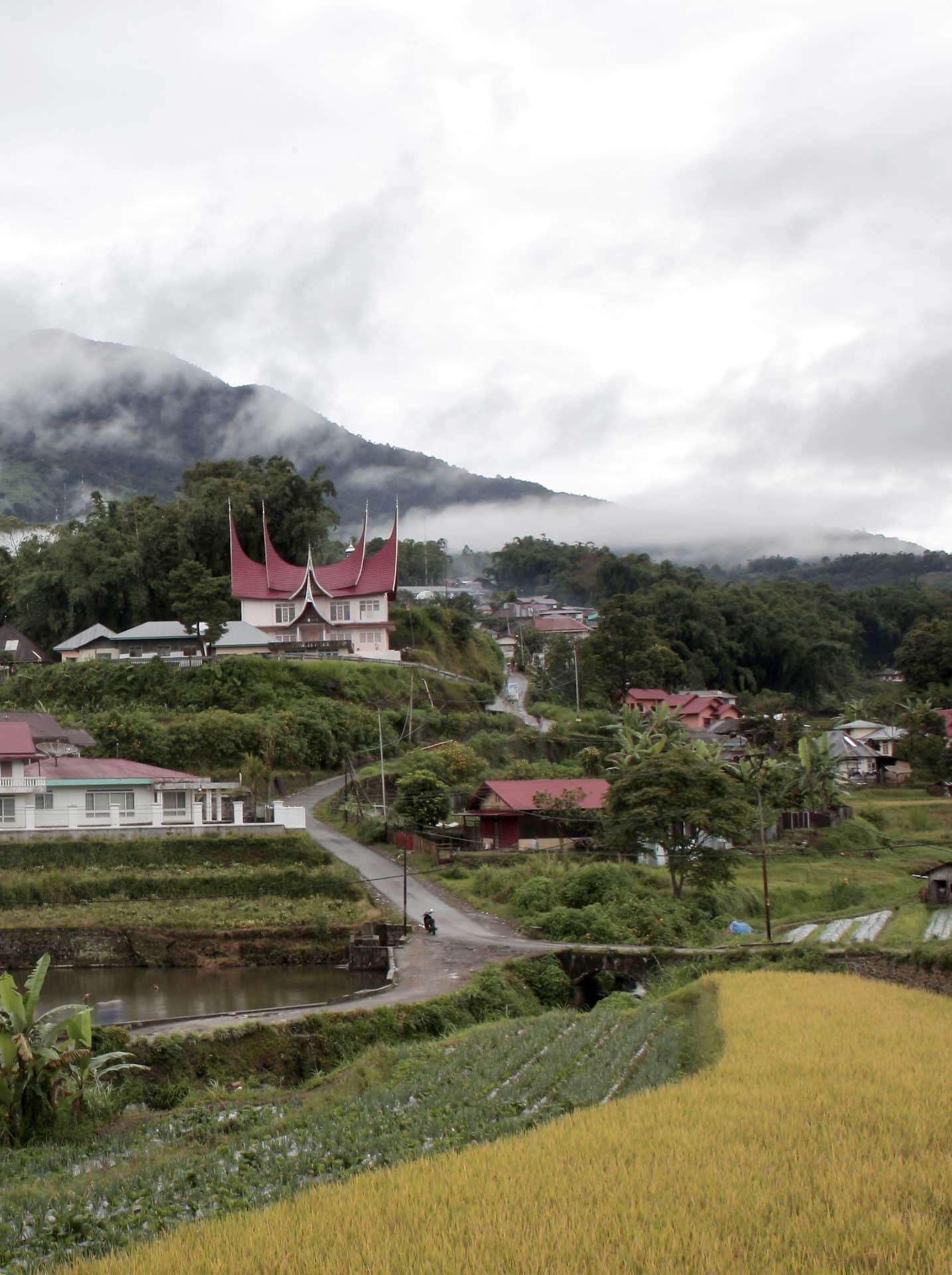
I myself come from the coast, from the edge of the Minangkabau world, which is, more or less, not too strict about adat compared to the Minangkabau ‘centre’ in the hills. I was raised in a culture that was freer, in an urban family in the city of Padang, the dense and lively West Sumatran capital. I received a modernized education right through to university, watched films and listened to songs, and filled up the bookshelves of our family library with foreign riches. It could be said I had fallen a pretty long way from my Minangkabau heritage. So when I decided to marry at a young age a woman from a place we call the darat or luhak, the adat-upholding Minangkabau heartland, my father had misgivings:
‘But will you be able to adjust?’ he asked. ‘Those people there hold to adat, all of them!’
Amid such anxieties, I was ‘released’ for marriage.
It really is strange, the feeling of living in a kampung. Even though I’ve now spent almost a decade attempting, within reason, to adapt to it, I still feel disturbed by people’s gazes and people’s judgements. It can seem like people are staring at me fixedly – like they’re seeking to see through me. I always feel like I’ve been caught at something, or robbed of something. It all appears to me to represent a threat to my inner self, who wants to be free.
*
One morning, all the adult men joined in volunteer work to clean up the kampung. Since 8am I’d been hanging around in the coffee shop close to the kampung ceremonial archway, readying myself to participate, making an effort to be a good member of the community. Turned out, though, that not many others showed up.
‘The village head might be curled up asleep still’, said a man waiting next to me.
The small group gathered here recalled the old village head who would, apparently, at 6:30 already be on hand at the location of any volunteer activity, far before anyone else. If he ordered the riverbank cleaned, he would be first to clamber down there and start working at it.
‘There’s nobody with that sort of competence any more’, said somebody else.
‘Leaders are only raised as high as a small branch, and only distanced from us by a step’, someone else said, invoking an old Malay expression. ‘A village head needs to be right at the front for anything like this – not other people waiting around for him’.
After not so long, as we continued talking, the village head, a middle-aged man, arrived.
‘Where are the people?’ he asked from atop his scooter.
‘What, there aren’t people sitting here? What are we then, apes?’ said one of us, sharply.
‘All the other men, I meant’, said the village head in hurried damage-control, chewing on his lip.
‘In the coffee shop near the intersection there are lots of people, go there’, said the oldest man among us. ‘A bit of attention and considerateness is needed to motivate people.’
The village head set off to the coffee shop the old man indicated. ‘It’s true that it’s not easy to guide our people’, he said to me authoritatively as he left. ‘Hard to order them or get them to obey those orders, they need to be invited very delicately to do things’. What was I to say? I just nodded in agreement.
Only after being reprimanded by the village head did lots of people gather. Dragged hoes made a shocking sound as they scraped against asphalt roads. Clangs of sickles and machetes rang out in the middle of this kampung that was still blanketed by fog. People moved as a wave toward the valley while beginning to trim and prune bushes along the roadsides and chop at giant bamboo and tall trees which were leaning over or hanging down and intruding on the roads. Irrigation channels that send water into the ricefields were cleaned, deepened and widened. Parts of the river were dammed and raised to better the flow of water. As the sun rose higher, bonfires began burning in several places, incinerating mountains of dried-out vegetation.
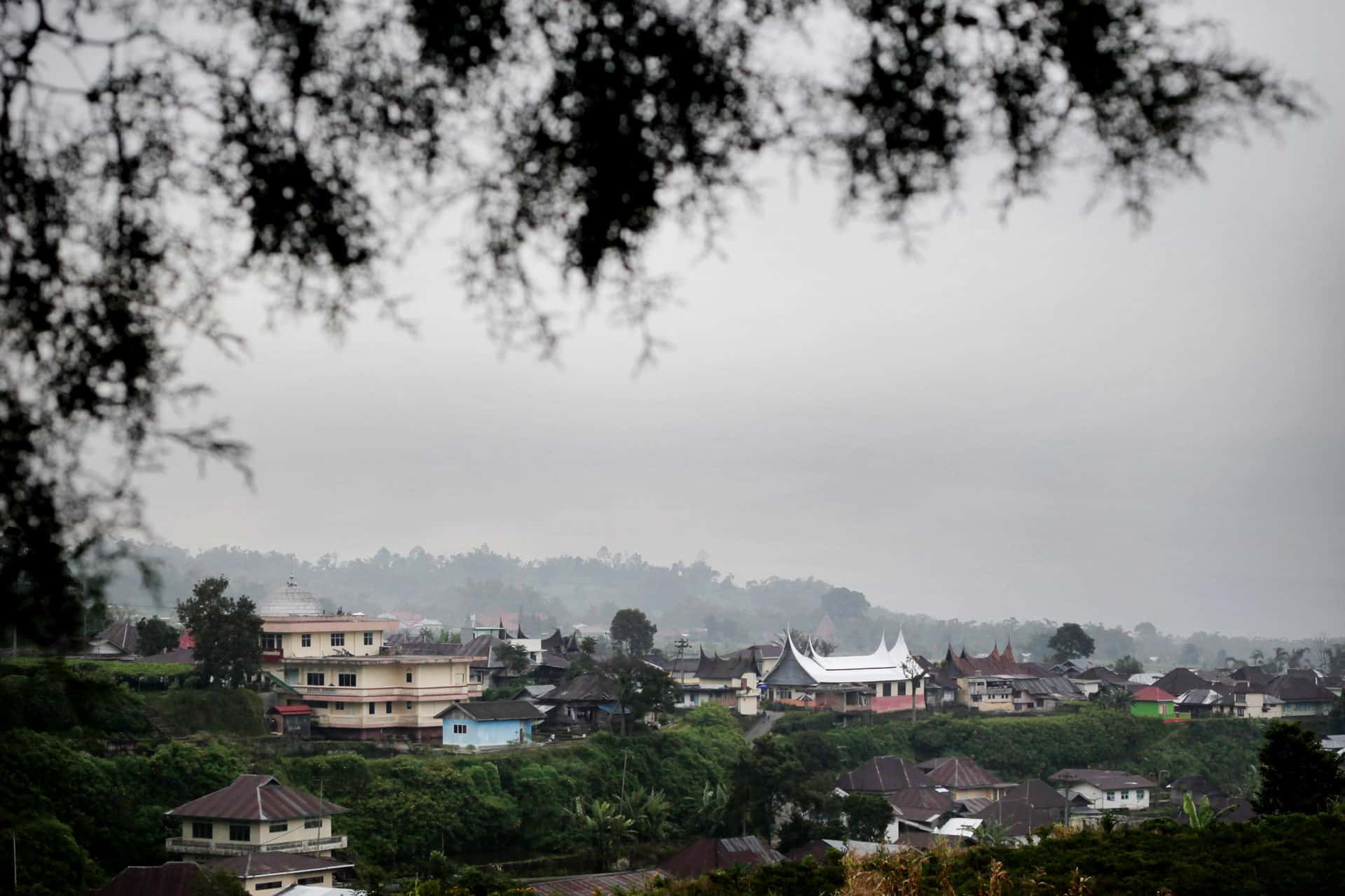
I only joined the work until the Dhuhr prayer. Then, I had to leave the kampung for Bukittinggi: I teach at a university there. But, driving along the road, I came face-to-face with some volunteers. Apparently they were still not finished. As we crossed paths, the people looked long at me. I felt guilty and awkward in this encounter. People viewed me out of the corner of their eyes: I suspected they were concluding I had not participated. Except that, looking about the kampung, it seemed lots of people, perhaps half, who had volunteered before the Dhuhr prayer had likewise not returned.
*
My wife really is a bonafide kampung person in my view – in the way she thinks, in her basic attitudes. Her grandmother, who raised her, successfully planted those qualities in her when she was young, and her other clan relatives continue to shape her now. Almost all her life has been spent in the kampung except for four years of higher education in Padang. We met pursuing knowledge at the same university, fell in love, and decided to wed. As we’ve lived under one roof, I’ve watched her often get asked by other kampung residents to help out. For any sort of event she’s happy to be involved, to go to the trouble. If a relation passes away in the neighbouring province, she goes to pay her respects. If a relation, whether close or distant, gets married, she won’t have the heart to not attend. ‘They’ll be so happy if we go’, she will say to me.
Very different to me. If my laziness-disease rises up when it comes to attending this or that function, my wife will often give me a warning.
‘A. came earlier and invited us to dinner’ she might tell me if someone has stopped by when I wasn’t home.
‘Is it alright if I don’t go?’
Then she’ll search for reasons why I should go.
‘How can you be so reluctant to meet people!’
‘It’s embarrassing… remember B.’s marriage last year, he [the person inviting us] attended that, right?’
Various reasons will be put forward which, like it or not, usually compel me to go along. But if my introversion is especially bad, and I don’t attend or am late, my wife – when somebody nosy asks her, ‘Where’s your man, how come he hasn’t shown up yet?’ – will be forced to explain my absence.
‘He’s still at the campus’.
‘I think he has a lot of work’
‘He’s very busy at the moment writing something in his room’.
‘Oh, he’s got a deadline!’
‘A friend is visiting him right now’.
Maybe people understand. I’m a writer, from the city, originally from the coast to boot … perhaps it’s not a problem, perhaps people just let it be, and limit themselves to thinking that’s outsiders for you: no understanding of adat.
Sometimes if there’s a recitation session at the mosque, my wife invites me to attend. ‘I’ve had it with hearing lectures’, I might say to her, then add, in jest, ‘Everywhere people are lecturing me – on campus too, at every possible opportunity the bigwigs lecture me without end’.
If someone dies in the kampung, my wife might tell me: ‘Just go to the grave, you don’t need to assist in the digging, just go and sit, just sitting will be enough!’
Same thing if there’s a wake to mourn somebody: if I don’t want to attend because I don’t know very well the family of the deceased, my wife’s lecture will be long, an explanation of family tree that unravels like a long, billowing thread. The person who died is the grandfather of this person, or there’s a connection with this grandmother, the clan ties between us and them are this and this and this… My whole day’s taken up listening to her recite the family tree.
‘If you live in a kampung, this is how it is’, she might say, finally. ‘Like it or not you need to attend people’s events, celebratory ones or mourning ones!’
‘Yep, yep – it seems like that’s so’, I might reply, uncertainly.
Yep, yep – here, many things demand to be considered.
*
You must consider the words that people use, the nature of people’s gazes or scowls. As of now, I’m still uncomfortable with all this. If I go anywhere, I always feel I’m under surveillance. The watchtower? That’s the coffee shop.
Understand, in the Minangkabau matrilineal system, the house is not a good place for men to be. Houses are solely women’s property, while men are supposed to traipse about in public spaces. For men who live in kampungs, especially Minangkabau kampungs, spending lots of time at home is considered less than ideal, in fact is looked upon downright unfavourably. So in terms of men’s daily activities, when they’re not at their workplace… yes indeed, they’ll be at the coffee shop.
They’ll head there after the dawn prayer. That gathering will disperse around 7am, as the sun’s turning yellow, when they get ready to go into the fields. They’ll head to the coffee shop again ahead of the Dhuhr prayer, for the midday hours of resting, before going into the fields again. Then to the coffee shop again before dusk, this time to not infrequently stay until the middle of the night. Apart from sleeping, very little time is spent in the house joking and messing about with children and wives.
Coffee shops are in every corner of the kampung. Go anywhere and you’ll find a coffee shop. Simply hoofing around in them constitutes much of the daily life for men here. And they become a place to scrutinize people’s activities and movements. Where’s that person going, what’s happening with him? People passing by are surveilled. It’s as if that type of gaze endeavours to take from people their uniqueness and their liberty. Being gazed at in that way feels like a raid or interrogation.
If someone doesn’t show up at the coffee-shop, people will ask: ‘Where’s X, how come he’s not here?’
Another will answer: ‘I guess he’s having a drink at his wife’s house!’
And that is a shameful thing: not the behaviour of a masculine man, to spend time day-to-day with his wife in the house. In his wife’s armpit every day. What sort of man is that – what a pansy!
When I first moved to the kampung, a man from my wife’s family told me about all of this, then took me along with him as he went from coffee shop to coffee shop. I was asked to bring some smokes and offer them to everyone, and to treat everybody to drinks. A form of politeness by which a new son-in-law could be assimilated into these busy gatherings.
Since then, I’ve routinely visited the coffee-shops. I’ve become a good listener, only saying something when it’s really necessary. It’s true you can get a lot of good information there, especially for farmers. The best and newest seeds or the pesticides most effective for particular crop diseases, for example. Information about the fluctuations of agricultural commodity prices that’s extremely up-to-date. We also very easily come to know the latest information about the kampung and all the gossip circulating about its inhabitants.
But for me, who’s not a serious farmer, and doesn’t really want to intrude into other people’s affairs, I also get bored with this limited type of talk. In recent times I’ve started to more often spend my days at home, reading, writing, watching TV or playing with my kids, then at the end of each week floating away into the solitude of tending fields. Sometimes I’ll still go to the coffee shop, just to answer the questions of the kampung’s inhabitants.
Meanwhile, the women also have places where they gather: in the ricefields or vegetable fields when they work them together; in the small wooden shelters where they sit for lunch; in the late afternoons at shops that sell vegetables; or at night, lying around in the mosque after the Maghrib prayer whilst waiting for the Isha prayer. There, too, events important and strange that happen in the kampung are discussed. Why someone’s daughter, no longer young, still hasn’t married. Why someone else’s adult child has not finished university while his former classmates are already working and starting families. Gossip, rumours, conjecture are given much space for discussion. Then there are the people who are considered ‘weird’, or behaviour that’s thought to be ‘deviant’, people who don’t participate in communal activities or attend kampung events. Those people will be stamped, and quietly belittled.
Social pressure in the kampung is intense. Maybe that’s why people migrate to other places in droves. Searching for a better economic fate, putting behind them the monotonous, dull routines of the kampung. But also wanting to free themselves from community obligations and conformity, and the shackles of adat. If you live in the kampung you can’t do anything, everything you do is observed, you’re watched over. To become a person who is freer, with more desirous life opportunities, people leave.
*
On Saturdays and Sundays, when I don’t go to campus, I’m usually in some fields not far from home. I plant various things, chilli and eggplant, corn and ginger, occasionally lettuce. Next to my fields are some onion fields owned by a man I recently got to know. Of large build and muscular, I’d assumed he’d be adept and at home working the fields. The man had previously lived as a migrant in Jakarta, selling clothes. But, hit by COVID, the Tanah Abang market there was shuttered, so he was forced to return to his hometown. He chose to farm. Because – what else is there?
But the man returned in the middle of the rainy season. So the fields weren’t really producing high-quality crops.
Once I met him in the coffee shop.
‘Getting a lot of onions?’ I said, trying to start a conversation.
‘Not many. Rain every day. Prices down, too.’
‘What are they going for now?’
‘15,000 per kilo’.
‘Gone up, compared to before’.
‘Yeah, gone up, but still nothing compared to the effort I put in!’
He told me he had decided to go back to Java. ‘Yeah, I’m going to cross the sea again.’
‘Why?’ I asked.
‘Here there’s no money, just rocks.’ He laughed.
‘But in Jakarta conditions are still bad, right? COVID’s hardly over’, I said.
He sipped his coffee, blew cigarette smoke up to the ceiling of the shop, and gave a bitter smile.
‘Yeah, but it’s okay, I’m more free there, I can do things, I’ve got more choices if I’m over there – you know?’
Indeed, there aren’t many choices in this kampung. Apart from farming, you can also become a motorbike taxi driver. One or two people make carvings in a workshop, too. Other gigs don’t really exist. While the social environment palpably presses in with its many demands.
Finally, I stopped seeing him around. In the fields, the coffee shop, the mosque, he wasn’t to be seen. The fields were now worked by his older brother.
‘He went back to Java. He didn’t like it here’, the man said when I asked him. ‘Hey, take some onions home with you.’
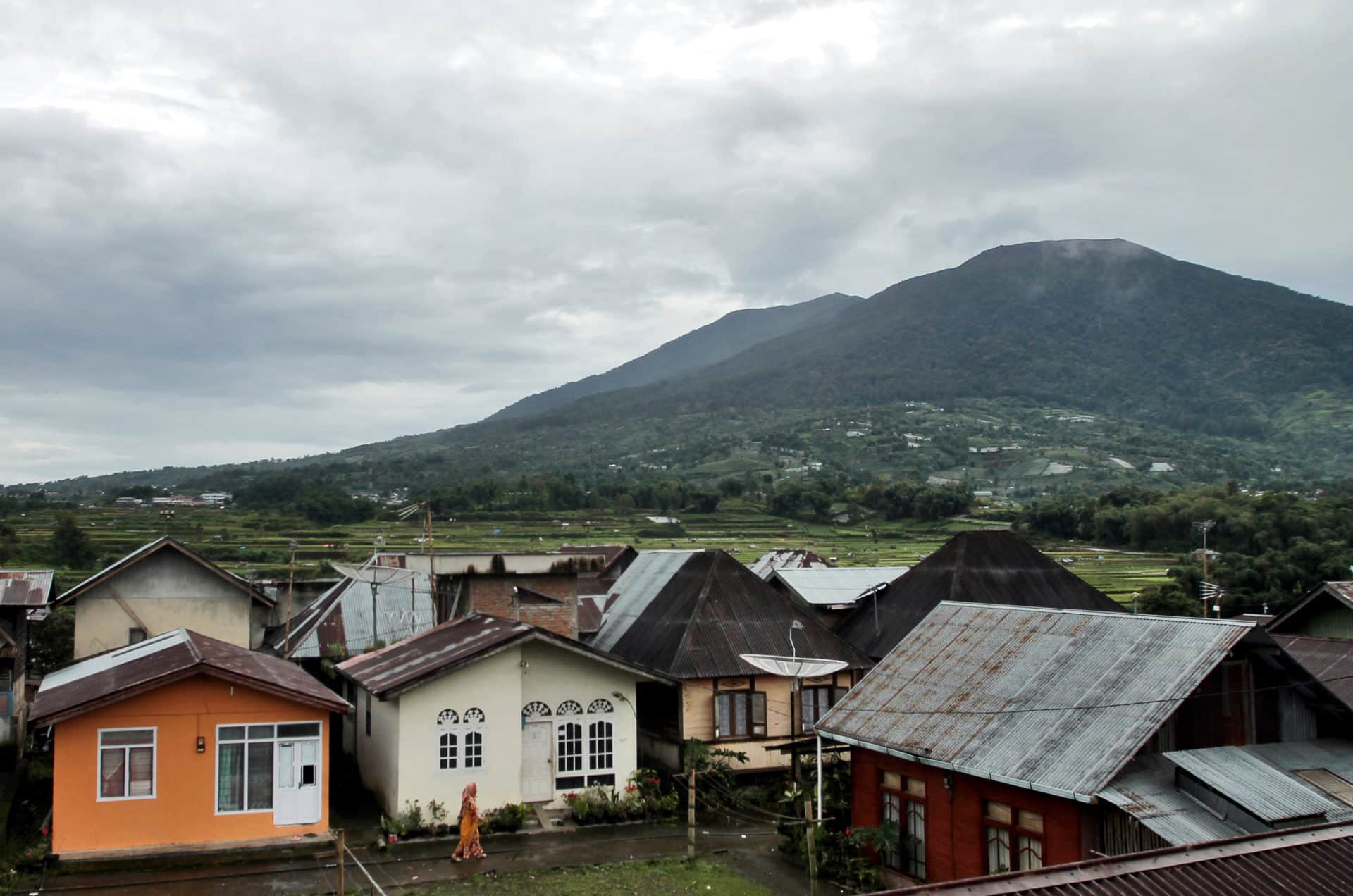
He handed to me a bunch of red onions still attached to their stalks. He also gave me two big round cabbages. I grinned happily.
‘You want some avocado? They’ve just appeared, it happens – just climb up and get a few!’
I looked at the avocado tree standing at the edge of a cliff on the edge of his fields – indeed, the avocados were coming in. I assented speedily.
The good thing about living in a kampung is, yes indeed, moments like this – little conversations where you end up with this or that. People are also quick to help if you have any difficulties. Sometimes it feels good to live in such a community, to immerse yourself in the bustling world of all these people. To be needed, and to need. It can make you feel as if life has meaning.
But with social penalties of breathtaking cruelty for things considered ‘wrong’ or ‘abnormal’.
*
Not long ago, a distant relative of my wife wanted to put on a wedding party. But three days before the big day, preparations were yet to begin in earnest. In their rumah gadang, or traditional Minangkabau house, only the groom-to-be and his mother were to be seen, plus one or two close relatives. The word was, no other relatives wanted to help out.
One evening, the relative hurriedly came to our house, eyes swollen, almost crying, searching for my wife.
‘Nobody’s willing to take on the task of inviting guests!’ she cried. ‘You’ll do it, won’t you? We’re asking for your help. Because, you’re so used to it, right?’
My wife agreed, though rather reluctantly. It really shouldn’t have been her who was asked: the woman had much closer relatives who should have been asked. The woman explained that before deciding to come to us she had visited a relative who would have been more appropriate, but had received a hurtful answer: ‘Oh, I can’t, I have to go to the ricefields to earn my paycheck, if I don’t, we won’t eat!’ But this couldn’t be right. She could spare a day or two to help a family event: I mean, there’s no way lending a hand would lead to not being able to eat.
Apparently, my wife told me, this woman who had come to us has a knack for getting into disputes: she likes to pull disagreements out of thin air with lots of people, sometimes over entirely trivial issues. She had recently brawled with neighbours just because a branch of their guava tree was hanging over her yard. Before that she’d got into a fight with her son-in-law that had forced him to leave the house and live in a wooden shelter in the middle of the ricefields. But the most fundamental reason why people keep their distance from her, my wife said, is because she doesn’t particularly involve herself in community rituals.
‘She rarely answers the requests of others for assistance, and doesn’t like attending other people’s events’, said my wife. ‘So, what she’s going through now, this is her social punishment, meted out to her by this community’.
But surely we should feel a little sorry for her too, I said. After all, the wedding and the party were getting closer and closer. Nobody had ticked off any part of the preparations, the food not cooked, the house not decorated, the invitations not delivered, and lots of other trivial tasks.
‘Let alone cooking, nobody’s even gone to the market yet!’ said my wife, chuckling a little.
‘Really, you can laugh, you can be happy at this?’ I said, surprised.
‘Yeah, well, what I said – she’s the one in the wrong. If this is the situation, what can we do? There’s no time left. Lots to be bought. Not to mention, the good meat for rendang will be hard to get at the market now: it has to be ordered from the butcher way in advance.’
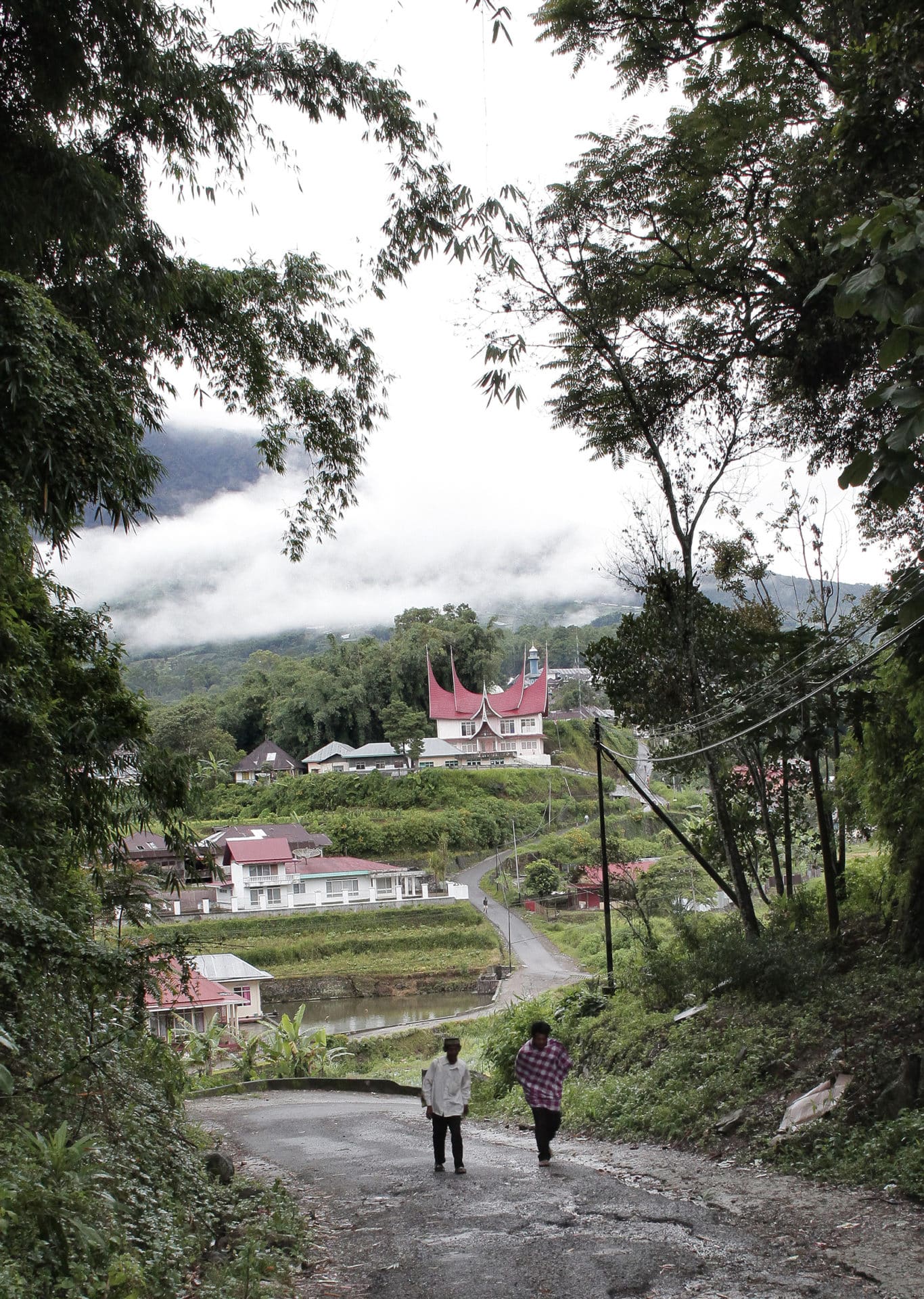
The woman had handed to my wife a piece of paper full of names of people who needed to be invited. Adat prescribes that, rather than receiving an invitation card, you get invited to a wedding by somebody visiting you, somebody going house-to-house. My wife asked me to take her by scooter as she completed this task.
‘Hey, so now it’s my turn to be hassled, is it – and look how many invitees there are!’
‘This is only the invitees to help to cook and prepare the event’, said my wife. ‘The invitation list to the party is a whole other thing, everyone in the kampung will be invited!’
We looked at the woman, falling apart in anxiety, pacing back and forth, looking almost dazed, occasionally sobbing.
‘She might faint before the party happens’, said my wife.
But in the end, the party went forward. The woman’s relatives softened their hearts, and all together they came to help. The guests and invitees also showed up, even if they were perhaps quietly grumbling. There was no meaningful setback: the whole thing came to a successful end.
My wife, while accepting a large packet of rendang, obtained as a reward, because she had helped out, looked at me, and said: ‘This event can be a lesson for us’.
© Deddy Arsya
English translation © Sarah Leys




